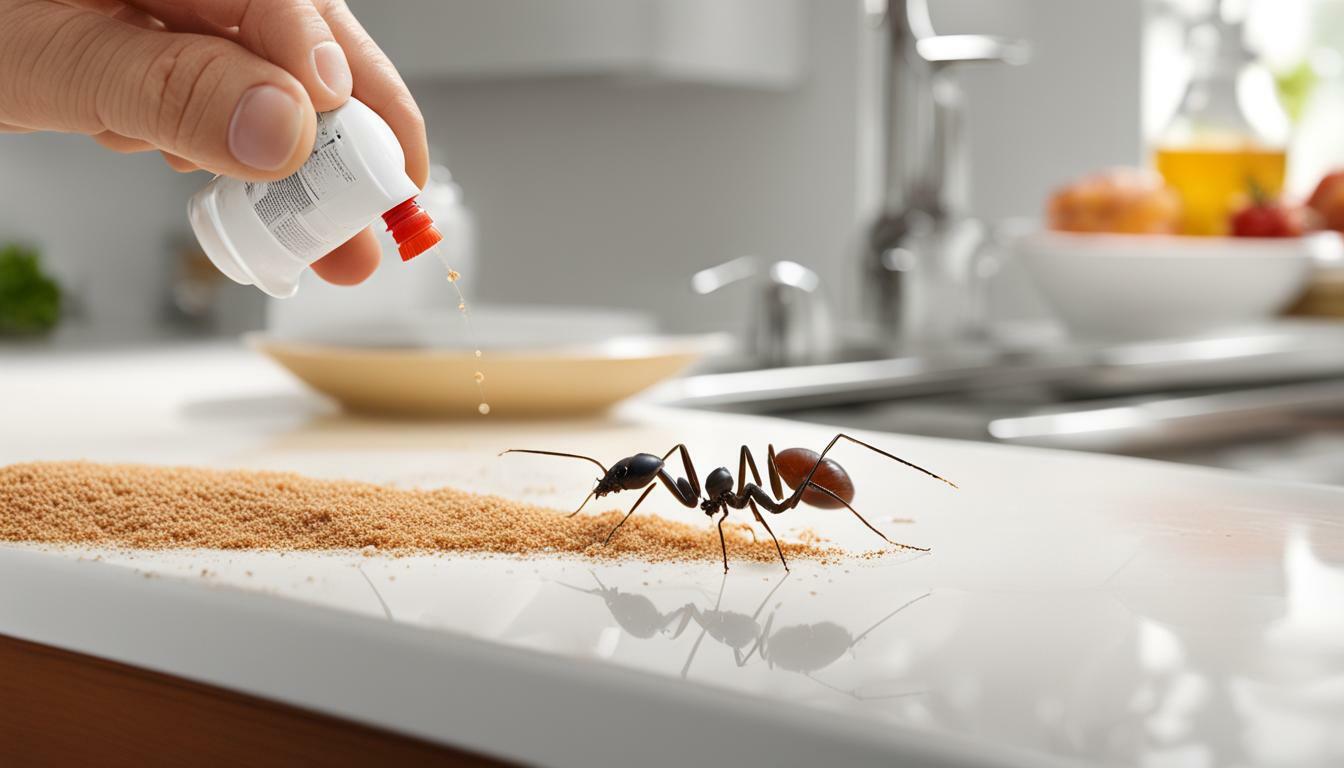
Welcome to my guide on getting rid of ants with pest control methods. In this section, we will answer a common question – can pest control effectively eliminate ants from your home? Ants can be a pesky problem for homeowners, but there are several options for effective control.
Ants can invade your living spaces and contaminate food, which can have negative consequences for your health. Even though ants are small, they can cause significant damage to your property. However, with the right approach, pest control can help eradicate these annoying pests from your home.
Key Takeaways
- Pest control methods can effectively eliminate ant infestations
- Ants can cause health and property damage
- Proactive measures and targeted treatments can help achieve effective pest control
Understanding Ant Behavior
Ants are highly social insects that live in colonies. Understanding their behavior is essential for effective pest control. Most ants live in underground nests, while others build nests in trees or in walls and foundations of buildings. They are attracted to food and water sources and are known for their efficient foraging habits.
Ants follow scent trails to locate food sources, and they can communicate with each other through chemical signals. Some species of ants are known for their aggressive behavior, such as biting and stinging, while others are harmless and simply a nuisance.
Knowing the habits and behavior of ants can help you develop a targeted pest control strategy to eliminate them from your home. By identifying the type of ant infestation and the location of their nests, you can employ the appropriate pest control method to effectively eradicate them.
Preventive Measures to Minimize Ant Infestations
Preventing ant infestations is crucial in maintaining an ant-free home. Here are some preventive measures that you can take:
- Seal entry points: Ants can enter through the smallest cracks and crevices. Seal all potential entry points, including doors, windows, and foundation walls, to prevent them from entering.
- Keep your home clean: Ants are attracted to food and water sources. Clean up spills and crumbs immediately, and store food in airtight containers. Keep your kitchen and dining area tidy.
- Eliminate standing water: Ants need water to survive. Fix any leaks and remove any standing water sources, such as pet bowls or plant saucers.
- Trim vegetation: Ants use plants and trees as bridges to enter your home. Keep vegetation trimmed away from your home’s exterior.
- Use ant deterrents: Certain scents, such as vinegar and cinnamon, repel ants. Use these natural deterrents around entry points and in areas where you have seen ant activity.
By implementing these preventive measures, you can significantly reduce the likelihood of ant infestations in your home. Consistency is key; make these habits a part of your routine to maintain an ant-free environment.
DIY Ant Control Methods
For those who prefer a hands-on approach, there are several do-it-yourself ant control methods that you can try. DIY ant control is a cost-effective and natural way to get rid of ants without resorting to harmful chemicals. Here are some effective techniques:
Natural Remedies
There are several natural remedies that you can use to repel and eliminate ants. One of the most popular is vinegar, which disrupts their pheromone trails, making it harder for them to communicate and navigate. Simply mix equal parts of vinegar and water in a spray bottle and apply it directly to ant trails and nests.
Another effective natural remedy is essential oils, such as peppermint, tea tree, and eucalyptus. These oils contain compounds that are toxic to ants and can deter them from entering your home. Apply a few drops of the oil to cotton balls and place them in areas where ants are commonly found.
Homemade Ant Baits
You can also create your own ant baits using a mixture of sugar and Borax. Borax is a natural mineral that is toxic to ants and can be found in most grocery stores. Mix equal parts of sugar and Borax and place the mixture in small containers or bottle caps. Leave the baits in areas where ants are active, and they will carry the mixture back to their colony, effectively killing off the entire population.
Non-Toxic Deterrents
If you prefer not to use chemicals, there are several non-toxic deterrents that you can try. One option is to create a barrier using food-grade diatomaceous earth, which is a fine powder made from the fossilized remains of marine organisms. This powder is abrasive to ants and can dehydrate them, effectively killing them off. Simply sprinkle the powder along entry points and ant trails.
You can also try using sticky barriers, such as double-sided tape or petroleum jelly, to block ants from entering your home. These barriers prevent ants from crawling over them, effectively trapping them in their tracks.
By using these DIY ant control methods, you can effectively eliminate ants from your home without relying on harmful chemicals. These natural solutions can be just as effective as conventional pest control methods and are often gentler on the environment.
Professional Pest Control for Ants
If you have tried DIY ant control methods but the problem persists, seeking professional pest control services may be the next step. A licensed pest control technician can help eliminate ants from your home in a safe and effective manner.
Professional ant extermination typically involves a thorough inspection of your property to identify the source and extent of the infestation. Once the technician has determined the type of ants and their nesting location, they will use targeted treatments to eradicate the colony.
The pest control expert may use a variety of methods, such as applying insecticides in strategic areas, implementing baiting techniques, or employing non-toxic repellents. They may also recommend follow-up visits to ensure complete eradication and prevent future infestations.
One advantage of hiring a professional pest control service for ant extermination is the expertise and experience they bring. They can quickly assess the situation, choose the most effective treatment, and implement it safely. Additionally, they can offer tips and advice on how to prevent future ant problems.
Another benefit is the peace of mind that comes with knowing the problem is being handled by a trained professional. With their knowledge and skills, they can help keep your home free from ant infestations, allowing you to enjoy a pest-free environment.
Integrated Pest Management for Long-Term Ant Control
To achieve long-term ant control, an integrated pest management (IPM) approach is often recommended. This method combines various ant control strategies to effectively eliminate ants and prevent future infestations.
IPM typically begins with a thorough inspection of the property to identify ant nests, entry points, and other factors contributing to the infestation. Once the source of the problem is determined, targeted treatments can be applied to eliminate the colony.
Preventive measures are also key components of IPM. These may include sealing entry points, eliminating food and water sources, and maintaining cleanliness to reduce ant attraction. Ongoing monitoring and follow-up treatments may also be necessary to ensure long-term ant control.
Advantages of Integrated Pest Management
Implementing an IPM plan for ant control offers numerous advantages, including:
- Reduced dependence on pesticides
- Effective elimination of the entire ant colony, including the queen
- Long-term ant control
- Minimized risk to humans, pets, and the environment
Overall, IPM provides a comprehensive and sustainable approach to ant control that can bring lasting results without relying solely on chemical treatments.
Non-Chemical Ant Control Options
If you prefer to avoid using chemical treatments for ant control, there are natural and eco-friendly options available. These non-chemical ant control methods are effective and safe for both humans and pets.
Here are some non-chemical ant control methods to consider:
- Essential oils: Certain essential oils, such as peppermint, cinnamon, and citrus oils, are known to repel ants. You can create a spray using these oils and water and apply it to ant-infested areas.
- Diatomaceous earth: This is a natural powder made from fossilized algae that is highly effective in killing ants. Sprinkle it around ant entry points or directly on ant trails.
- Vinegar: Ants dislike the strong scent of vinegar. You can use a spray bottle to apply a vinegar solution around your home or directly on ant-infested areas.
It is important to note that while these non-chemical ant control options are effective, they may require more frequent application than chemical treatments. Additionally, they may not be suitable for severe or persistent ant infestations.
Remember to always read and follow the instructions when using any pest control method, including non-chemical options.
Conclusion
In conclusion, achieving an ant-free home is possible through a combination of preventive measures, targeted treatments, and ongoing monitoring. Understanding ant behavior is crucial in devising effective pest control strategies. DIY ant control methods, natural remedies, and non-chemical options are viable alternatives for those who prefer a hands-on approach or have concerns about using pesticides.
If you’re dealing with persistent ant infestations or large colonies, seeking professional pest control services can provide the expertise and equipment necessary for effective ant extermination. For long-term ant control, an integrated pest management approach combining various pest control methods is recommended.
Remember, prevention is key to minimizing the likelihood of ant infestations. Maintaining cleanliness, sealing entry points, and eliminating sources of food and water can go a long way in preventing ant infestations from taking hold in your home. Stay vigilant and take proactive steps to keep your home ant-free.
FAQ
Q: Can pest control get rid of ants?
A: Yes, pest control methods can effectively eliminate ants from your home.
Q: Why is it important to understand ant behavior?
A: Understanding ant behavior helps in strategizing how to eliminate them.
Q: What preventive measures can minimize ant infestations?
A: Sealing entry points and maintaining cleanliness are some effective preventive measures.
Q: Are there any DIY ant control methods?
A: Yes, there are several do-it-yourself ant control methods, such as natural remedies, homemade ant baits, and non-toxic deterrents.
Q: Should I consider professional pest control for ants?
A: Seeking professional pest control services can be highly beneficial for persistent ant infestations or large colonies.
Q: What is integrated pest management and how does it help with ant control?
A: Integrated pest management combines various methods, including preventive measures, targeted treatments, and ongoing monitoring, for long-term ant control.
Q: Are there non-chemical ant control options available?
A: Yes, there are alternative natural and eco-friendly approaches to eliminate ants without relying on chemical treatments.
Q: Can pest control methods really get rid of ants effectively?
A: Yes, achieving an ant-free home is possible with the right understanding of ant behavior, implementation of preventive measures, and suitable pest control techniques.
- Does Flea Treatment Kill Lice? - September 8, 2023
- Does Flea Treatment Kill Mites? - September 8, 2023
- How to Put Flea Treatment on a Dog? - September 8, 2023






